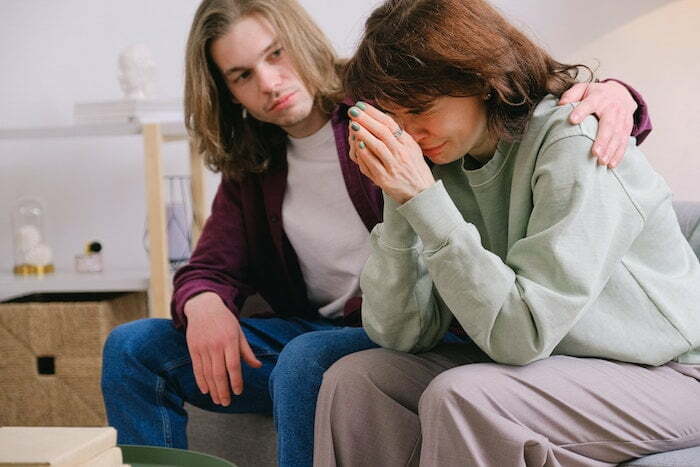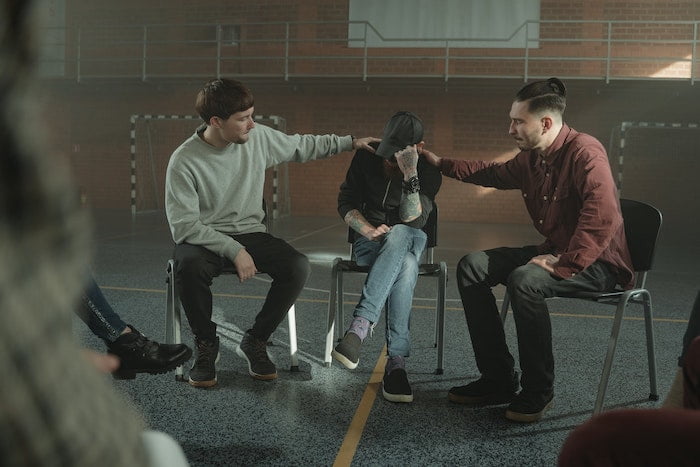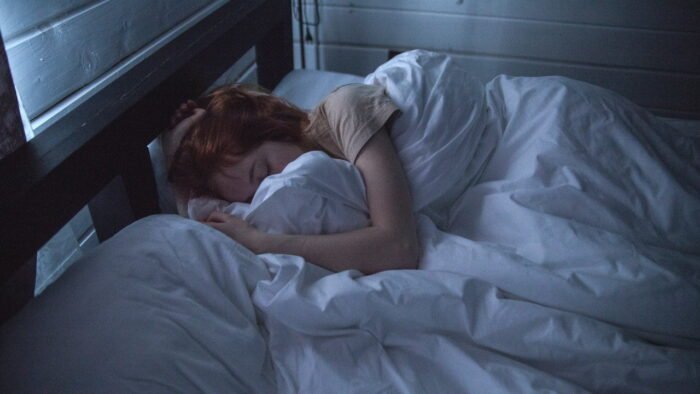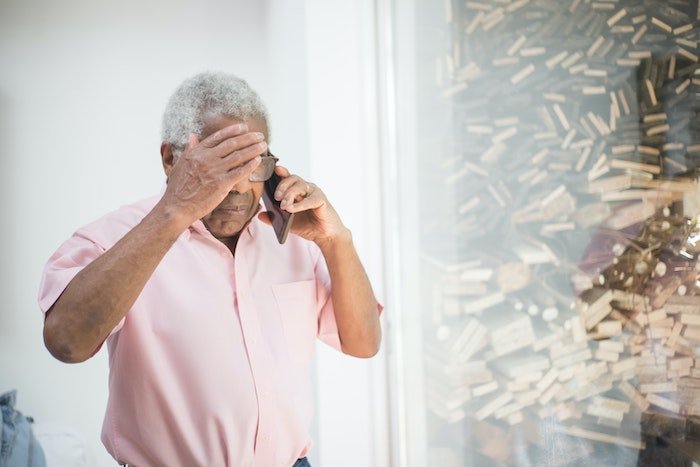Drug & Alcohol Rehab in Plymouth
Quick Links for help with addiction in Plymouth
- The cost of an alcohol rehab in Plymouth
- The differences between inpatient and outpatient support in Plymouth
- Alcohol detox and rehab in Plymouth
Are you an addiction sufferer looking to move forward with your life? Are you wondering what the key signs and symptoms of addiction even are? Are you looking for guidance in the rehab process?
OK Rehab is made up of people who’ve been through everything you’re experienced and who want to help. Here, we hope we can answer some questions below, to ease some of your fears about addiction treatment.
We’ve got all the information you could need to know about drug and alcohol rehab in Plymouth, or anywhere else.
You may also be scared of judgement or shame – but we want to assure you of two things. The first is that addiction is actually a lot more common than you think and is nothing to be ashamed of.
In fact, between April 2018 and March 2020, official statistics show that 270,705 adults received some kind of help for addiction.
The second important thing you need to know is that no one at OK Rehab will judge you, at all. Like we said before, a majority of us have experienced all of this, so we understand how tough it can be. You don’t need to suffer in silence.
81 people died due to alcohol in Plymouth between 2016-18.[1] That’s a huge amount for a city. Accessing a drug and alcohol rehab in Plymouth is the safest and most effective way of quitting the substance.
Below, OK Rehab provides some statistics about alcohol and drug use in Plymouth:
| Drug and Alcohol Statistics for Plymouth (2016-2018) | Data | |
|
14.4 | |
| Number deemed as dependent drinkers | 2.6% | |
| Number deemed as hazardous drinkers in Plymouth | 24.2% | |
| Percentage increase in alcohol-related hospital admissions (2002-2010) | over 71% |
To begin your recovery journey today, call our 24-Hour Helpline: 0800 326 5559
What interventions can you do at home in Plymouth?

Image above: A man comforting a woman at a drug and alcohol rehab in Plymouth
Supporting a loved one in the family home can be difficult when they have an addiction. This is because of how the illness alters the person’s thought patterns and behaviours.
Trying to navigate around this can be extremely upsetting.
There are two main types of interventions you can try. The first is one you have likely already thought of. It’s where you talk to your loved one about their addiction and advise them to go to an alcohol rehab in Plymouth.
You can actually carry this out with a professional. This has the benefit of emphasising the seriousness of the situation and also, the professional person can lead the session objectively.
Another intervention families are using more often is known as the CRAFT approach. It’s where you adopt a structure to follow that provides guidance on how to communicate with your loved one.
It takes into account where your family member is in the cycle of addiction and advises you in relation to that. The goal is to focus on positive and healthy behaviours and building strong dynamics within the family.
People find this an effective way of supporting loved ones to choose to go to rehab themselves.
The cost of an alcohol rehab in Plymouth

Depending on where you go, the cost can range from budget options to expensive luxury options. As well as this, there are in-house choices that affect cost such as whether you share a room with other residents or opt for your own sole-occupancy room.
Some rehab clinics in the Plymouth region can cost as much as £10,000 a week. On the other side of the scale, you can pay as little as £1,000 a week.
To find out more about your local options, contact OK Rehab and one of our friendly advisors can run you through this topic.
Does health insurance cover residential treatment at rehab in Plymouth?
In some cases, your health insurance will cover the cost of a stay at rehab to treat alcohol and drug addiction. You’ll need to have a read-through of your policy to make sure.
It’s important to keep in mind that claiming through your insurance will obviously affect premiums in the future.
Some people access a rehab placement through the health insurance provided by their place of employment. While this can be a great option, it’s likely you’ll be under oath to inform your employers of the addiction and the claim.
Are rehab placements available through NHS funding in Plymouth?
It’s possible for some people to enter an alcohol rehab in Plymouth through NHS funding. In order to be able to access the funding you must meet particular eligibility requirements.
- Firstly, you must be able to prove that you’ve been in regular contact with local NHS drug and alcohol services. You must be able to demonstrate that you’re doing everything possible to heal and recover.
- Secondly, you’ll be from a low-income background.
- Finally, in order to access funding, you’ll need to apply to the local council. People usually do this with the aid of their drug and alcohol workers at local services.
At this point, you then wait to find out from the council if your application is going to be successful. With the best will in the world, it can be difficult to get funding, purely because of the level of competition for it.
Statutory-Funded Addiction Help in Plymouth:
Here are a few organisations near you in Plymouth to help with your recovery.
1. Alcoholics Anonymous
Address: Breakwater Works, Breakwater Rd, Plymstock, Plymouth PL9 7HJ
Telephone: 08457 697 555
Website: http://www.alcoholics-anonymous.org.uk/
2. Harbour Drug & Alcohol Service
Address: Hyde Park House, Mutley, Plymouth PL4 6LF
Telephone: 01752 434 343
Website: http://www.harbour.org.uk/
3. Reestart Recovery Houses
Address: 17 Stoke Rd, Stonehouse, Plymouth PL1 5JG
Telephone: 07876 620 353
Website: http://www.reestartrecovery.co.uk/
For further support, reach out to helplines such as Mind UK, YoungMinds, Rethink Mental Illness, Samaritans, Papyrus and SMART Recovery.
In addition to this, find your local Alcoholics Anonymous, Narcotics Anonymous or Cocaine Anonymous group to meet people with similar experiences to you. Check out the NHS website for further help and support.
To begin your recovery journey today, call our 24-Hour Helpline: 0800 326 5559
Tell me more about NHS and private rehabilitation approaches in Plymouth

When considering your options for professional support around rehabilitation and recovery, it’s good to know the differences between NHS and private services.
The NHS (or government-funded) services operate from a hub central to Plymouth. They’re available to anyone who is in active addiction.
Every week, there’s a schedule of activities that people can go to such as 12 Step groups, drop-in clinics, and SMART recovery. There is usually some limited availability for one-to-one support from one of the drug and alcohol workers.
Private services operate as in-house rehabilitation clinics where people go to stay overnight for a period of time in order to receive treatments.
Each person is assessed by a psychiatrist or clinical psychologist so that the clinic understands precisely what treatments are needed for the individual.
From there, you receive a timetable that includes a variety of holistic and psychological therapies, individual and group sessions. As well as daily activities, you’ll be provided a nutritious meal plan to support your brain and body to heal and strengthen.
The differences between inpatient and outpatient support in Plymouth
As an inpatient, you go to a clinic and stay for a period of time. In NHS services, this is only possible in a hospital ward in relation to addiction so only happens when people reach crisis point.
In private clinics, you stay as an inpatient for around four to six weeks. Some people might be at a crisis point, but others won’t be.
All will, however, be at the point where they want to become sober. It’s an intensive approach to quitting substances and developing skills to maintain abstinence.
In outpatient services, you remain living at home but go to the clinic to receive treatment such as counselling, therapy, or a needle exchange. NHS drug and alcohol services are run as outpatient clinics.
Some private clinics offer outpatient services to previous residents as part of an aftercare programme.
Alcohol detox and rehab in Plymouth

Despite its legality, alcohol is the cause of one of the most dangerous addictions out there. This is because of how it changes the functioning of the brain.
This substance causes dependency meaning that without it, your body physically starts to malfunction; seizures and even death are possible.
If you have a moderate to severe addiction, or dependency, then a stay at an alcohol rehab in Plymouth is the most effective way to wean off alcohol and become sober. On entering rehab, you’ll go into withdrawal.
Symptoms include:
The first seven to ten days you’ll be prescribed a medication called Librium. This manages uncomfortable symptoms and keeps you safe.
After this detox period, you’ll then move onto therapeutic treatments to equip you with the techniques to manage cravings.
You’ll start to learn how to manage moments where you have historically turned to drinking in a new and healthy way.
Rehab for cocaine in Plymouth
It’s common knowledge in the addiction field that cocaine use is on the rise and alongside that, crack use is also increasing. Both substances cause highly compulsive use.
Interestingly, where cocaine is often glamorised in films and TV shows, crack-cocaine is stigmatised. There isn’t much difference in relation to their chemical makeup.
These substances lead people to experience the following:
- Anxiety
- Low mood and mood swings
- Restlessness
- Reduced appetite and weight loss
- Skin sores
- Erosion of nose cartilage
- Increased colds and flu
- Increased risk of cancer and heart attack
At rehab, you’ll learn about how your thought patterns can be triggered by internal and external things which lead you down a path to use.
You’ll be shown how to interrupt these thought patterns and redirect them. This gives you back control.
As well as this, you’ll be supported in counselling to express your thoughts and feelings around addiction, the substance, your past and future.
Rehab for heroin in Plymouth

It’s well-known that heroin is hard to quit. This is because it causes both a psychological addiction and a physical addiction (like alcohol does).
During withdrawal, users experience incredibly uncomfortable symptoms including:
- Shaking
- Sweating
- Sickness and nausea
- Diarrhoea
- Bone and muscle pain
- Anxiety and overwhelm
- Emotional flashbacks
- Severe cravings
At a private clinic, you’ll be given a tailored programme of therapies. To start your stay, you’ll enter a detox which will include a Subutex prescription.
This medication eases your symptoms so that you aren’t in pain and remain calm. It lasts around seven to ten days after which you’ll be sober.
From this point, you’ll then need to learn the skills of how to maintain abstinence in the future. You’ll learn how to manage cravings, how to develop a healthy relationship with yourself, and what you need to do going forward to create a positive life.
Rehab for cannabis in Plymouth
Many people don’t think about cannabis addiction in relation to a stay at rehab but with the increase in strong skunk strains, it’s becoming increasingly necessary.
THC strains of cannabis are psychoactive.
This means that they alter the way your brain works and how you feel. When this happens, an addiction can form.
While there’s no one cause of addiction, people who develop them tend to have common background factors, including:
- Low self-worth
- A family history of addiction
- A history of trauma
- An environment where people use substances
- Mental health conditions
During your stay at rehab, you’ll come to explore what led you to using cannabis and explore what purpose you feel it continues to serve.
You’ll discuss the things you do and don’t like about it, as well as think about what stopping and continuing use would mean.
Group sessions offer a safe and encouraging way to be healthily challenged by peers at the clinic. You’ll make friends and find a space of resonance and connection.
To begin your recovery journey today, call our 24-Hour Helpline: 0800 326 5559
What therapy do you have at rehab in Plymouth?

Others will be tweaked towards your personality:
- The psychotherapy on offer includes both cognitive and dialectical behavioural therapies. The first teaches you how your thoughts and brain control your behaviours and how to adapt thoughts to create positive new habits. The second is provided for people who have emotional trauma and for those who aren’t skilled in emotional regulation. When you can process emotions effectively, you’re able to manage cravings more positively.
- Motivational interviewing is provided to give you a space to honestly talk about your relationship with, and thoughts around the substance you use. This can be a great space to say what about it has provided you with a space of comfort. It’s also the space where you’ll develop true motivation to heal.
- Counselling is offered to provide people with a relaxed space to talk about whatever is on their minds.
- Holistic activities include music therapy, art therapy, acupuncture, yoga, reiki, mindfulness, and equine therapy.
- 12 step groups are a regular occurrence bringing you the opportunity to honestly approach your addiction, and regrets, and to start identifying how to form self-compassion (a pillar to build recovery from).
- SMART recovery groups offer a practical way to think about recovery. Many people want to know how to tackle each moment, hour, or day. That means knowing how to set yourself small steps to get through the day making healthy choices.
- Some people will have family therapy. In-person is available if family live near the clinic, alternatively, some people have on-line sessions. The facilitator is able to help rebuild familial relationships and improve dynamics.
What a dual diagnosis means if you receive one in Plymouth

A dual diagnosis is where a professional identifies a patient as having two conditions co-existing at the same time. When it comes to addiction, is very common. The diagnosis might be for heroin addiction and depression, for instance.
At a drug and alcohol rehab in Plymouth, you’ll be treated in light of both conditions. This is because addiction and mental health conditions often cause and/or exacerbate the other.
Therefore, being treated for both provides the optimum space for recovery to begin.
What do private rehab clinics do around relapse in Plymouth?
It’s important you have a relapse prevention plan in place as part of your aftercare. The staff at the private clinic will discuss relapse with you as part of your therapeutic sessions.
It’s important to talk about what things have made you use and relapse in the past and what your worries around this are going forward.
A space of honesty helps you to develop a more robust plan. Together with staff, you’ll create a plan which will outline how to prevent relapse and what steps to follow should you lapse or relapse.
Psychological signs of addiction

The psychological symptom you’ll probably be most familiar with is that all-encompassing inability to stop, no matter what the cost might end up being.
Some others are increased paranoia, increased anxiety, a decrease in coordination, insomnia, confusion, drowsiness, panic attacks, decreased concentration or even hallucinations.
These will all likely be less visible than the physical symptoms we’re about to list below, but they’re as significant as any other side effect. As a disorder, studies have shown that addiction rewires your brain, leaving its mark in many corners of victims’ lives.
To begin your recovery journey today, call our 24-Hour Helpline: 0800 326 5559
Physical symptoms of addiction
Addiction doesn’t just cause changes to your behaviour – it leaves many physical traces too.
These include:
- Nausea
- Red eyes
- Slurred speech
- Dizziness
- A dry mouth
- Weight loss
Like other symptoms of addiction, these will of course vary depending on what you’re addicted to. Some may also be more noticeable or more extreme than others – but all of them can be significant, especially if they’re happening alongside the psychological symptoms we’ve already mentioned.
Many other physical side effects of addiction fall into the category of withdrawal symptoms.
The biggest difference between this and other symptoms of addiction is that, whilst other symptoms occur due to the substances you’re addicted to, withdrawal symptoms happen when they’re taken away.
They can be just as unpleasant as other physical symptoms of addiction, sometimes more so and can even become dangerous in some cases.
Some of the most common are:
- Hot and cold flushes
- Muscle cramps
- Seizures
- Sweating
- Hallucinations
- Diarrhoea
- Insomnia
- Tremors
- Vomiting
We should also note that these withdrawal symptoms can often be very different depending on what you’re withdrawing from, so it might be a good idea to research based on your specific addiction.
We’ll talk about medically assisted detoxes in more detail later, but all of these symptoms will either be lessened or won’t occur at all if you detox with assistance, rather than attempting to do it alone.
Attempts to do it alone will also most likely fail due to the tricky nature of addiction, or could even become dangerous with some of the symptoms we’ve listed above.
To begin your recovery journey today, call our 24-Hour Helpline: 0800 326 5559
Should I get treatment in Plymouth?
If you’re struggling with any of the symptoms we’ve discussed above, the answer to this question is an emphatic yes. Reaching out is the best way to manage addiction on a long-term basis, especially as it’s a complex disorder that can often have multiple root causes.
You may also feel overwhelmed, or not know where to even start when it comes to rehab. But if you get in touch with Ok Rehab, we’ll be able to direct you towards all the right services. Some of the most common are residential rehab, physical treatment and counselling/therapy.
We should also note that, while the latter two may fall into the same category, they’re actually quite different. Whilst counselling is more generalised, therapy is more specialised. You may go through one or both, and you may experience both in different amounts. It all just depends on what works best for you.
Before all of that, whilst we’re on the subject of helpful processes we should also let you know that a medically assisted detox is the usual way that addiction treatment begins. This attempt to get any and all addictive substances out of your system can be a vital part of the recovery process.
To diverge topics slightly again, if you’re looking specifically for drug and alcohol rehab in Plymouth, nearly all of these treatments are available.
And they’ll be available on a local level when you’ve finished either inpatient or outpatient treatment, in what’s known as aftercare. If you would like to know more about that, we go into further detail on it below, in the segment called “What will happen after rehab?”.
Reaching out on behalf of a loved one in Plymouth

Addiction isn’t just hard on the person experiencing it. If you’re concerned for anyone you know, we can also help with our intervention programme.
For all the brain changing reasons we mentioned above, it can be incredibly difficult to get through to someone who needs help and to watch them spiral. But, like treatment itself, if you reach out it can get easier.
If you are reading this for the sake of someone else, we also want to assure you right here that they can get better and manage their addiction. It might just take a bit of time and effort.
To begin your recovery journey today, call our 24-Hour Helpline: 0800 326 5559
How far back can therapies go?
Now that we’ve mentioned therapy, you may be wondering how deep into your past you’ll actually have to dive in such sessions. The truth is, many addictions stem from past trauma, so if you go through therapy to heal your addiction, there will come a time when you need to talk about it.
Going out of your comfort zone in that way might seem scary, but processing and confronting the causes of your problems in this way could be the best way to recover.
And even if you do have to go back to some traumatic events, remember that it’s only your past, which is impacting your present and won’t be in your future.
A number of evidence-based therapies will be offered, such as cognitive behavioural therapy, dialectical behaviour therapy and motivational interviewing.
Should I take anything with me to residential rehab in Plymouth?

Most residential rehab centres will let you take personal items with you, or will even encourage it.
If you go down this road, you should research the place you’re planning on going to specifically, but here’s a general list of what’s usually allowed and/or advised:
- A notebook
- Sentimental jewellery, with one descriptive example being wedding rings
- Pictures of loved ones
- Some money
- A notebook
- Clothes, toiletries and anything else you might need on a practical level for day to day living
How long will treatment usually last in Plymouth?
This is another one that can vary quite a bit depending on the severity of your addiction. It goes without saying that some people need to spend longer in rehab, whilst some people will finish treatment much more quickly.
This will of course also change depending on the kind of treatment you’re looking into. But we can say that in our experience, an average course of residential treatment lasts for around 40 to 19 days.
It’s also very hard to pin an endpoint on the recovery process, as it will really likely be a lifelong journey. This might not be easy to hear, but at OK Rehab we believe that addiction can’t ever really be fully cured, only managed.
But that doesn’t mean you can’t go back to the life you had before. Rehab will give you the skills you need to get all of that back and get your world back on track.
To begin your recovery journey today, call our 24-Hour Helpline: 0800 326 5559
What will happen after rehab in Plymouth?
Healing from addiction is a continual journey. As such, after you’ve finished initial treatment, we highly recommend seeking out aftercare.
This usually primarily consists of the same treatments we listed above, such as physical and mental health therapies.
Even if you’ve been to residential rehab and have returned home, continuing to access support is always a good idea. As we said above, this is likely to be a continual journey no matter what your level of addiction is.
Aftercare is offered for an additional 12 months once you leave the rehab. You can return for weekly aftercare sessions at the weekend, as well as attend fellowship meetings such as Narcotics Anonymous, SMART Recovery or Alcoholics Anonymous.
The services Rehab Recovery can offer are available across Exeter, Dartmouth, Torquay, Kingsbridge, Totnes, Exmouth, Salcombe, Woolacombe, Dawlish, Budleigh Salterton, Okehampton, Tiverton, Dittisham, Ashburton, Newton Abbot, Axminster, Seaton, Bigbury-on-Sea, Great Torrington, South Molton, Crediton, Branscombe, Bideford, Chagford, Braunton,Cockington, Paignton, Hartland, Lustleigh, Cullompton, Moretonhampstead, Holsworthy, Instow, Brixham, Ivybridge, and many more around Devon.
References
[1] https://www.plymouthherald.co.uk/news/plymouth-news/alcohol-killing-more-plymouth-people-3606336





